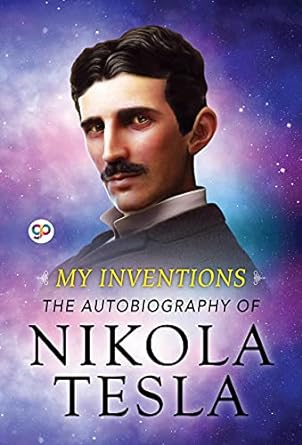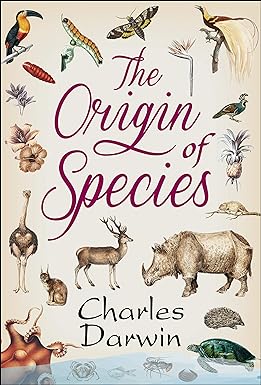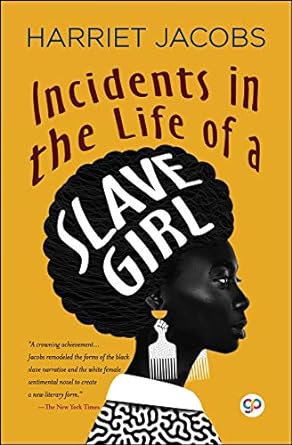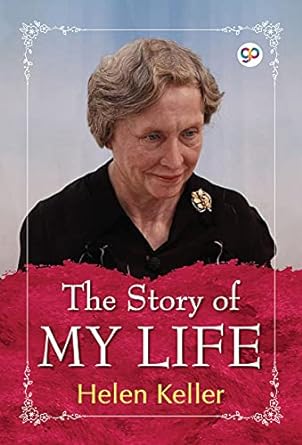
My Inventions: The Autobiography of Nikola Tesla
Nikola Tesla (1857-1943) was a revolutionary Serbian scientist who forever changed the scientific fields of electricity and magnetism. His research laid much of the groundwork for modern electrical and communication systems, and his impressive accomplishments include development of the alternating-current electrical system, radio, the Tesla coil transformer, wireless transmission, and fluorescent lighting.
His dream of wireless communication came to pass in both the radio and eventually the cell phone. Yet his story remains widely unknown. History buffs, science enthusiasts, backyard inventors, and anyone who has ever dared to dream big will find the life of Nikola Tesla, written in his own words, engaging, informative, and humorous in its eccentricity.
BEST DEALS
About the Author
Nikola Tesla was a genius polymath, inventor and a mechanical and electrical engineer. He is frequently cited as one of the most important contributors to the birth of commercial electricity, a man who "shed light over the face of Earth," and is best known for his many revolutionary developments in the field of electricity and magnetism in the late 19th and early 20th centuries. Tesla's patents and theoretical work formed the basis of modern alternating current (AC) electric power systems, including the polyphase power distribution systems and the AC motor, with which he helped usher in the Second Industrial Revolution.
Born an ethnic Serb in the village of Smiljan, Vojna Krajina, in the territory of today's Croatia, he was a subject of the Austrian Empire by birth and later became an American citizen. After his demonstration of wireless communication (radio) in 1894 and after being the victor in the "War of Currents", he was widely respected as one of the greatest electrical engineers who worked in America. Much of his early work pioneered modern electrical engineering and many of his discoveries were of groundbreaking importance. During this period, in the United States, Tesla's fame rivaled that of any other inventor or scientist in history or popular culture, but due to his eccentric personality and his seemingly unbelievable and sometimes bizarre claims about possible scientific and technological developments, Tesla was ultimately ostracized and regarded as a mad scientist. Never having put much focus on his finances, Tesla died impoverished at the age of 86.
The SI unit measuring magnetic flux density or magnetic induction (commonly known as the magnetic field "B"), the tesla, was named in his honor (at the Conférence Générale des Poids et Mesures, Paris, 1960), as well as the Tesla effect of wireless energy transfer to wirelessly power electronic devices which Tesla demonstrated on a low scale (lightbulbs) as early as 1893 and aspired to use for the intercontinental transmission of industrial energy levels in his unfinished Wardenclyffe Tower project. Aside from his work on electromagnetism and electromechanical engineering, Tesla contributed in varying degrees to the establishment of robotics, remote control, radar and computer science, and to the expansion of ballistics, nuclear physics, and theoretical physics. In 1943, the Supreme Court of the United States credited him as being the inventor of the radio. Many of his achievements have been used, with some controversy, to support various pseudosciences, UFO theories, and early New Age occultism.
Read Sample
Chapter 1 : My Early Life
The progressive development of man is vitally dependent on invention. It is the most important product of his creative brain. Its ultimate purpose is the complete mastery of mind over the material world, the harnessing of the forces of nature to human needs. This is the difficult task of the inventor who is often misunderstood and unrewarded. But he finds ample compensation in the pleasing exercises of his powers and in the knowledge of being one of that exceptionally privileged class without whom the race would have long ago perished in the bitter struggle against pitiless elements. Speaking for myself, I have already had more than my full measure of this exquisite enjoyment; so much, that for many years my life was little short of continuous rapture. I am credited with being one of the hardest workers and perhaps I am, if thought is the equivalent of labor, for I have devoted to it almost all of my waking hours. But if work is interpreted to be a definite performance in a specified time according to a rigid rule, then I may be the worst of idlers.
Every effort under compulsion demands a sacrifice of life-energy. I never paid such a price. On the contrary, I have thrived on my thoughts. In attempting to give a connected and faithful account of my activities in this story of my life, I must dwell, however reluctantly, on the impressions of my youth and the circumstances and events which have been instrumental in determining my career. Our first endeavors are purely instinctive promptings of an imagination vivid and undisciplined. As we grow older, reason asserts itself and we become more and more systematic and designing. But those early impulses, though not immediately productive, are of the greatest moment and may shape our very destinies. Indeed, I feel now that had I understood and cultivated instead of suppressing them, I would have added substantial value to my bequest to the world. But not until I had attained manhood did I realize that I was an inventor.
This was due to a number of causes. In the first place I had a brother who was gifted to an extraordinary degree, one of those rare phenomena of mentality which biological investigation has failed to explain. His premature death left my earth parents disconsolate. (I will explain my remark about my “earth parents” later.) We owned a horse which had been presented to us by a dear friend. It was a magnificent animal of Arabian breed, possessed of almost human intelligence, and was cared for and petted by the whole family, having on one occasion saved my dear father’s life under remarkable circumstances.
My father had been called one winter night to perform an urgent duty and while crossing the mountains, infested by wolves, the horse became frightened and ran away, throwing him violently to the ground. It arrived home bleeding and exhausted, but after the alarm was sounded, immediately dashed off again, returning to the spot, and before the searching party were far on the way they were met by my father, who had recovered consciousness and remounted, not realizing that he had been lying in the snow for several hours. This horse was responsible for my brother’s injuries from which he died. I witnessed the tragic scene and although so many years have elapsed since, my visual impression of it has lost none of its force. The recollection of his attainments made every effort of mine seem dull in comparison. Anything I did that was creditable merely caused my parents to feel their loss more keenly. So I grew up with little confidence in myself.
But I was far from being considered a stupid boy, if I am to judge from an incident of which I have still a strong remembrance. One day the Aldermen were passing through a street where I was playing with other boys. The oldest of these venerable gentlemen, a wealthy citizen, paused to give a silver piece to each of us. Coming to me, he suddenly stopped and commanded, “Look in my eyes.” I met his gaze, my hand outstretched to receive the much valued coin, when to my dismay, he said, “No, not much; you can get nothing from me. You are too smart.”
They used to tell a funny story about me. I had two old aunts with wrinkled faces, one of them having two teeth protruding like the tusks of an elephant, which she buried in my cheek every time she kissed me. Nothing would scare me more than the prospects of being kissed by these affectionate, unattractive relatives. It happened that while being carried in my mother’s arms, they asked who was the prettier of the two. After examining their faces intently, I answered thoughtfully, pointing to one of them, “This here is not as ugly as the other.”
Then again, I was intended from my very birth for the clerical profession and this thought constantly oppressed me. I longed to be an engineer, but my father was inflexible. He was the son of an officer who served in the army of the Great Napoleon and in common with his brother, professor of mathematics in a prominent institution, had received a military education; but singularly enough, later embraced the clergy in which vocation he achieved eminence. He was a very erudite man, a veritable natural philosopher, poet and writer and his sermons were said to be as eloquent as those of Abraham a-Sancta-Clara. He had a prodigious memory and frequently recited at length from works in several languages. He often remarked playfully that if some of the classics were lost he could restore them. His style of writing was much admired. He penned sentences short and terse and full of wit and satire. The humorous remarks he made were always peculiar and characteristic. Just to illustrate, I may mention one or two instances.
Among the help, there was a cross-eyed man called Mane, employed to do work around the farm. He was chopping wood one day. As he swung the ax, my father, who stood nearby and felt very uncomfortable, cautioned him, “For God’s sake, Mane, do not strike at what you are looking but at what you intend to hit.”
On another occasion he was taking out for a drive a friend who carelessly permitted his costly fur coat to rub on the carriage wheel. My father reminded him of it saying, “Pull in your coat; you are ruining my tire.”
He had the odd habit of talking to himself and would often carry on an animated conversation and indulge in heated argument, changing the tone of his voice. A casual listener might have sworn that several people were in the room.
Although I must trace to my mother’s influence whatever inventiveness I possess, the training he gave me must have been helpful. It comprised all sorts of exercises, as guessing one another’s thoughts, discovering the defects of some form of expression, repeating long sentences or performing mental calculations. These daily lessons were intended to strengthen memory and reason, and especially to develop the critical sense, and were undoubtedly very beneficial.
My mother descended from one of the oldest families in the country and a line of inventors. Both her father and grandfather originated numerous implements for household, agricultural and other uses. She was a truly great woman, of rare skill, courage and fortitude, who had braved the storms of life and passed through many a trying experience. When she was sixteen, a virulent pestilence swept the country. Her father was called away to administer the last sacraments to the dying and during his absence she went alone to the assistance of a neighboring family who were stricken by the dread disease. She bathed, clothed and laid out the bodies, decorating them with flowers according to the custom of the country and when her father returned he found everything ready for a Christian burial.
My mother was an inventor of the first order and would, I believe, have achieved great things had she not been so remote from modern life and its multifold opportunities. She invented and constructed all kinds of tools and devices and wove the finest designs from thread which was spun by her. She even planted the seeds, raised the plants and separated the fibers herself. She worked indefatigably, from break of day till late at night, and most of the wearing apparel and furnishings of the home were the product of her hands. When she was past sixty, her fingers were still nimble enough to tie three knots in an eyelash.
There was another and still more important reason for my late awakening. In my boyhood I suffered from a peculiar affliction due to the appearance of images, often accompanied by strong flashes of light, which marred the sight of real objects and interfered with my thoughts and action. They were pictures of things and scenes which I had really seen, never of those imagined. When a word was spoken to me the image of the object it designated would present itself vividly to my vision and sometimes I was quite unable to distinguish whether what I saw was tangible or not. This caused me great discomfort and anxiety. None of the students of psychology or physiology whom I have consulted, could ever explain satisfactorily these phenomenon. They seem to have been unique, although I was probably predisposed as I know that my brother experienced a similar trouble. The theory I have formulated is that the images were the result of a reflex action from the brain on the retina under great excitation. They certainly were not hallucinations such as are produced in diseased and anguished minds, for in other respects I was normal and composed. To give an idea of my distress, suppose that I had witnessed a funeral or some such nerve-wracking spectacle. Then, inevitably, in the stillness of night, a vivid picture of the scene would thrust itself before my eyes and persist despite all my efforts to banish it. If my explanation is correct, it should be possible to project on a screen the image of any object one conceives and make it visible. Such an advance would revolutionize all human relations. I am convinced that this wonder can and will be accomplished in time to come. I may add that I have devoted much thought to the solution of the problem.
I have managed to reflect such a picture, which I have seen in my mind, to the mind of another person, in another room. To free myself of these tormenting appearances, I tried to concentrate my mind on something else I had seen, and in this way I would often obtain temporary relief; but in order to get it I had to conjure continuously new images. It was not long before I found that I had exhausted all of those at my command; my ‘reel’ had run out as it were, because I had seen little of the world – only objects in my home and the immediate surroundings. As I performed these mental operations for the second or third time, in order to chase the appearances from my vision, the remedy gradually lost all its force. Then I instinctively commenced to make excursions beyond the limits of the small world of which I had knowledge, and I saw new scenes. These were at first very blurred and indistinct, and would flit away when I tried to concentrate my attention upon them. They gained in strength and distinctness and finally assumed the concreteness of real things. I soon discovered that my best comfort was attained if I simply went on in my vision further and further, getting new impressions all the time, and so I began to travel; of course, in my mind. Every night, (and sometimes during the day), when alone, I would start on my journeys – see new places, cities and countries; live there, meet people and make friendships and acquaintances and, however unbelievable, it is a fact that they were just as dear to me as those in actual life, and not a bit less intense in their manifestations.
This I did constantly until I was about seventeen, when my thoughts turned seriously to invention. Then I observed to my delight that I could visualize with the greatest facility. I needed no models, drawings or experiments. I could picture them all as real in my mind. Thus I have been led unconsciously to evolve what I consider a new method of materializing inventive concepts and ideas, which is radially opposite to the purely experimental and is in my opinion ever so much more expeditious and efficient.
The moment one constructs a device to carry into practice a crude idea, he finds himself unavoidably engrossed with the details of the apparatus. As he goes on improving and reconstructing, his force of concentration diminishes and he loses sight of the great underlying principle. Results may be obtained, but always at the sacrifice of quality. My method is different. I do not rush into actual work. When I get an idea, I start at once building it up in my imagination. I change the construction, make improvements and operate the device in my mind. It is absolutely immaterial to me whether I run my turbine in thought or test it in my shop. I even note if it is out of balance. There is no difference whatever; the results are the same. In this way I am able to rapidly develop and perfect a conception without touching anything. When I have gone so far as to embody in the invention every possible improvement I can think of and see no fault anywhere, I put into concrete form this final product of my brain. Invariably my device works as I conceived that it should, and the experiment comes out exactly as I planned it. In twenty years there has not been a single exception. Why should it be otherwise? Engineering, electrical and mechanical, is positive in results. There is scarcely a subject that cannot be examined beforehand, from the available theoretical and practical data. The carrying out into practice of a crude idea as is being generally done, is, I hold, nothing but a waste of energy, money, and time.
My early affliction had, however, another compensation. The incessant mental exertion developed my powers of observation and enabled me to discover a truth of great importance. I had noted that the appearance of images was always preceded by actual vision of scenes under peculiar and generally very exceptional conditions, and I was impelled on each occasion to locate the original impulse. After a while this effort grew to be almost automatic and I gained great facility in connecting cause and effect. Sooner I became aware, to my surprise, that every thought I conceived was suggested by an external impression. Not only this but all my actions were prompted in a similar way. In the course of time it became perfectly evident to me that I was merely an automation endowed with power of movement responding to the stimuli of the sense organs and thinking and acting accordingly. The practical result of this was the art of teleautomatics which has been so far carried out only in an imperfect manner. Its latent possibilities will, however be eventually shown. I have been years planning self-controlled automata and believe that mechanisms can be produced which will act as if possessed of reason, to a limited degree, and will create a revolution in many commercial and industrial departments. I was about twelve years of age when I first succeeded in banishing an image from my vision by willful effort, but I never had any control over the flashes of light to which I have referred. They were, perhaps, my strangest and [most] inexplicable experience. They usually occurred when I found myself in a dangerous or distressing situations or when I was greatly exhilarated. In some instances I have seen all the air around me filled with tongues of living flame. Their intensity, instead of diminishing, increased with time and seemingly attained a maximum when I was about twenty-five years old.
While in Paris in 1883, a prominent French manufacturer sent me an invitation to a shooting expedition which I accepted. I had been long confined to the factory and the fresh air had a wonderfully invigorating effect on me. On my return to the city that night, I felt a positive sensation that my brain had caught fire. I was a light as though a small sun was located in it and I passed the whole night applying cold compressions to my tortured head. Finally the flashes diminished in frequency and force but it took more than three weeks before they wholly subsided. When a second invitation was extended to me, my answer was an emphatic NO!
These luminous phenomena still manifest themselves from time to time, as when a new idea opening up possibilities strikes me, but they are no longer exciting, being of relatively small intensity. When I close my eyes I invariably observe first, a background of very dark and uniform blue, not unlike the sky on a clear but starless night. In a few seconds this field becomes animated with innumerable scintillating flakes of green, arranged in several layers and advancing towards me. Then there appears, to the right, a beautiful pattern of two systems of parallel and closely spaced lines, at right angles to one another, in all sorts of colors with yellow, green, and gold predominating. Immediately thereafter, the lines grow brighter and the whole is thickly sprinkled with dots of twinkling light. This picture moves slowly across the field of vision and in about ten seconds vanishes on the left, leaving behind a ground of rather unpleasant and inert gray until the second phase is reached. Every time, before falling asleep, images of persons or objects flit before my view. When I see them I know I am about to lose consciousness. If they are absent and refuse to come, it means a sleepless night. To what an extent imagination played in my early life, I may illustrate by another odd experience.
Like most children, I was fond of jumping and developed an intense desire to support myself in the air. Occasionally a strong wind richly charged with oxygen blew from the mountains, rendering my body light as cork and then I would leap and float in space for a long time. It was a delightful sensation and my disappointment was keen when later I undeceived myself. During that period I contracted many strange likes, dislikes and habits, some of which I can trace to external impressions while others are unaccountable. I had a violent aversion against the earrings of women, but other ornaments, as bracelets, pleased me more or less according to design. The sight of a pearl would almost give me a fit, but I was fascinated with the glitter of crystals or objects with sharp edges and plane surfaces. I would not touch the hair of other people except, perhaps at the point of a revolver. I would get a fever by looking at a peach and if a piece of camphor was anywhere in the house it caused me the keenest discomfort. Even now I am not insensible to some of these upsetting impulses. When I drop little squares of paper in a dish filled with liquid, I always sense a peculiar and awful taste in my mouth. I counted the steps in my walks and calculated the cubical contents of soup plates, coffee cups and pieces of food; otherwise my meal was unenjoyable. All repeated acts or operations I performed had to be divisible by three and if I missed I felt impelled to do it all over again, even if it took hours. Up to the age of eight years, my character was weak and vacillating. I had neither courage nor strength to form a firm resolve. My feelings came in waves and surges and variated unceasingly between extremes. My wishes were of consuming force and like the heads of the hydra they multiplied. I was oppressed by thoughts of pain in life and death and religious fear. I was swayed by superstitious belief and lived in constant dread of the spirit of evil, of ghosts and ogres and other unholy monsters of the dark. Then all at once, there came a tremendous change which altered the course of my whole existence.
Of all things I liked books best. My father had a large library and whenever I could manage I tried to satisfy my passion for reading. He did not permit it and would fly in a rage when he caught me in the act. He hid the candles when he found that I was reading in secret. He did not want me to spoil my eyes. But I obtained tallow, made the wicking and cast the sticks into tin forms, and every night I would bush the keyhole and the cracks and read, often till dawn, when all others slept and my mother started on her arduous daily task.
On one occasion I came across a novel entitled Aoafi, (the son of Aba), a Serbian translation of a well-known Hungarian writer, Josika. This work somehow awakened my dormant powers of will and I began to practice self-control. At first my resolutions faded like snow in April, but in a little while I conquered my weakness and felt a pleasure I never knew before – that of doing as I willed.
In the course of time this vigorous mental exercise became second to nature. At the outset my wishes had to be subdued but gradually desire and will grew to be identical. After years of such discipline I gained so complete a mastery over myself that I toyed with passions which have meant destruction to some of the strongest men. At a certain age I contracted a mania for gambling which greatly worried my parents. To sit down to a game of cards was for me the quintessence of pleasure. My father led an exemplary life and could not excuse the senseless waste of my time and money in which I indulged. I had a strong resolve, but my philosophy was bad. I would say to him, “I can stop whenever I please, but is it worthwhile to give up that which I would purchase with the joys of paradise?” On frequent occasions he gave vent to his anger and contempt, but my mother was different. She understood the character of men and knew that one’s salvation could only be brought about through his own efforts. One afternoon, I remember, when I had lost all my money and was craving for a game, she came to me with a roll of bills and said, “Go and enjoy yourself. The sooner you lose all we possess, the better it will be. I know that you will get over it.” She was right. I conquered my passion then and there and only regretted that it had not been a hundred times as strong. I not only vanquished but tore it from my heart so as not to leave even a trace of desire.
Ever since that time I have been as indifferent to any form of gambling as to picking teeth. During another period I smoked excessively, threatening to ruin my health. Then my will asserted itself and I not only stopped but destroyed all inclination. Long ago I suffered from heart trouble until I discovered that it was due to the innocent cup of coffee I consumed every morning. I discontinued at once, though I confess it was not an easy task. In this way I checked and bridled other habits and passions, and have not only preserved my life but derived an immense amount of satisfaction from what most men would consider privation and sacrifice.
After finishing the studies at the Polytechnic Institute and University, I had a complete nervous breakdown and, while the malady lasted, I observed many phenomena, strange and unbelievable…












